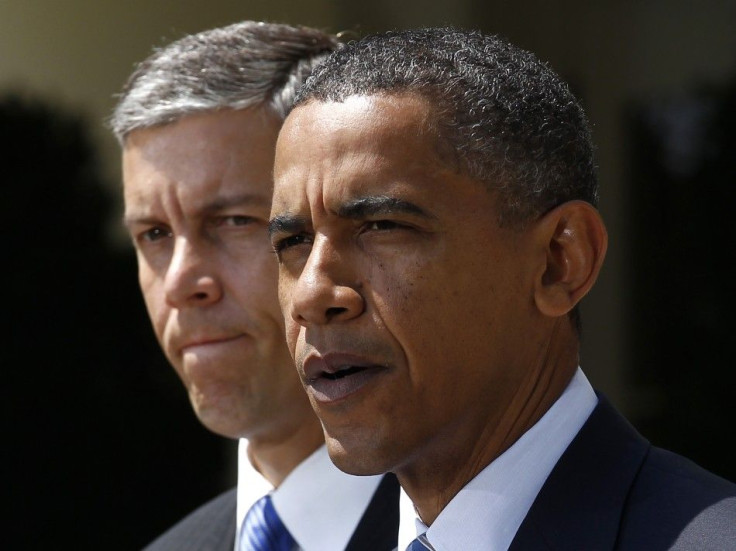Obama Administration Overhauls No Child Left Behind, Bypassing Congress

Citing Congressional inaction on education reform, the White House announced on Monday that it would grant waivers exempting states from an onerous achievment benchmark established by No Child Left Behind.
Enacted during President George W. Bush's administration and renewed annually since 2007, No Child Left Behind tethered school accountability to nationalized tests and punished schools that registered failing grades. It also mandated that 100 percent of students be proficient in math and reading by 2014, a goal Education Secretary Arne Duncan said was unattainable and could lead to 80 percent of schools being designated as failing as he repeatedly pressured Congress to rewrite the law.
"Principals, superintendents and children cannot wait forever for the legislative process to work itself out," Duncan said. "As it exists now, No Child Left Behind is creating a slow-motion train wreck for children, parents and teachers."
Duncan's announcement that he will grant eligible states waivers from the provision makes good on his promise to circumvent Congress if lawmakers didn't move to rewrite No Child Left Behind. Rep. John Kline, R-Minn., chairman of the House Education and the Workforce Committee, said at the time that the President cannot impose deadlines on Congress, and told reporters that Duncan is "not the nation's superintendent." But Congress failed to act, so Duncan did.
"I remain concerned that temporary measures instituted by the department, such as conditional waivers, could undermine" efforts by Congress to rewrite the law, Kline said in a Friday statement. Sen. Tom Harkin, D-Iowa,, chairman of the Senate Education Committee, acknowleded that "it is undeniable that this Congress faces real challenges reaching bipartisan, bicameral agreement on anything."
The waivers represent a mechanism for the Obama administration to push its education policies. States applying for waivers must prove they are adopting measures like those sought in Race to the Top, a program in which states competed for federal money by enacting changes like evaluating teacher effectiveness based on student achievement. That has prompted some criticism that Duncan is trying to push through the administration's education agenda without congressional oversight.
"It sounds like they're trying to do a back-door Round 3 of Race to the Top, and that's astonishing," Frederick Hess of the American Enterprise Institute told The New York Times, calling Duncan's plan "a dramatically broad reading of executive authority."
Duncan said the administration's approach would be more tailored to the needs of individual districts, which he contrasted with No Child Left Behind "forcing districts into one-size-fits-all solutions that just don't work."
"We're still hopeful that Congress can continue its work this fall," Duncan said. "In the meantime, states and districts have an opportunity to move forward."
© Copyright IBTimes 2024. All rights reserved.





















